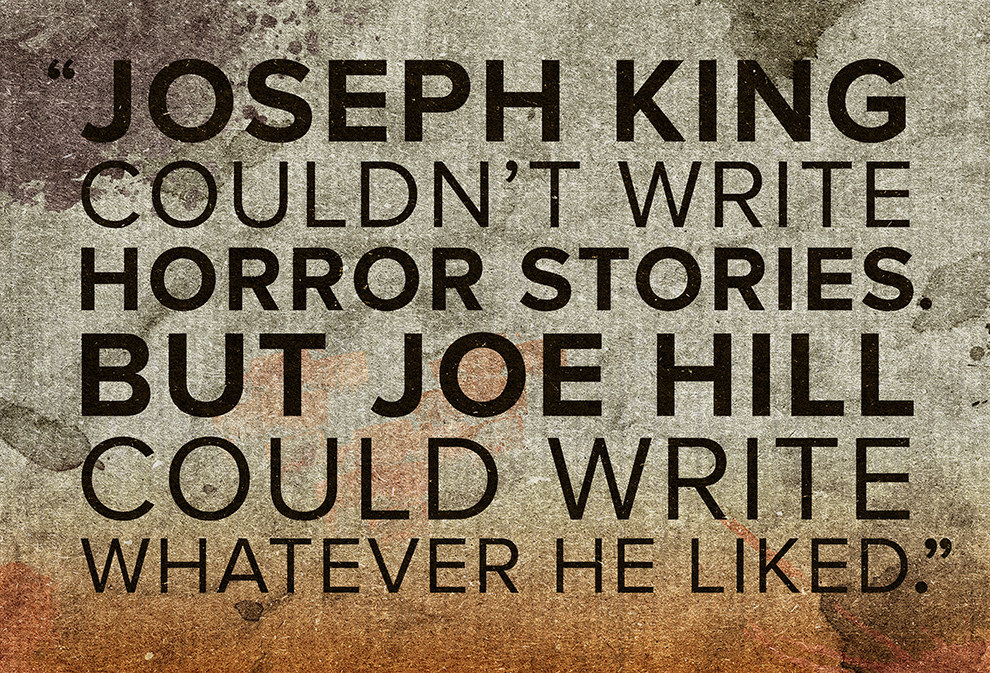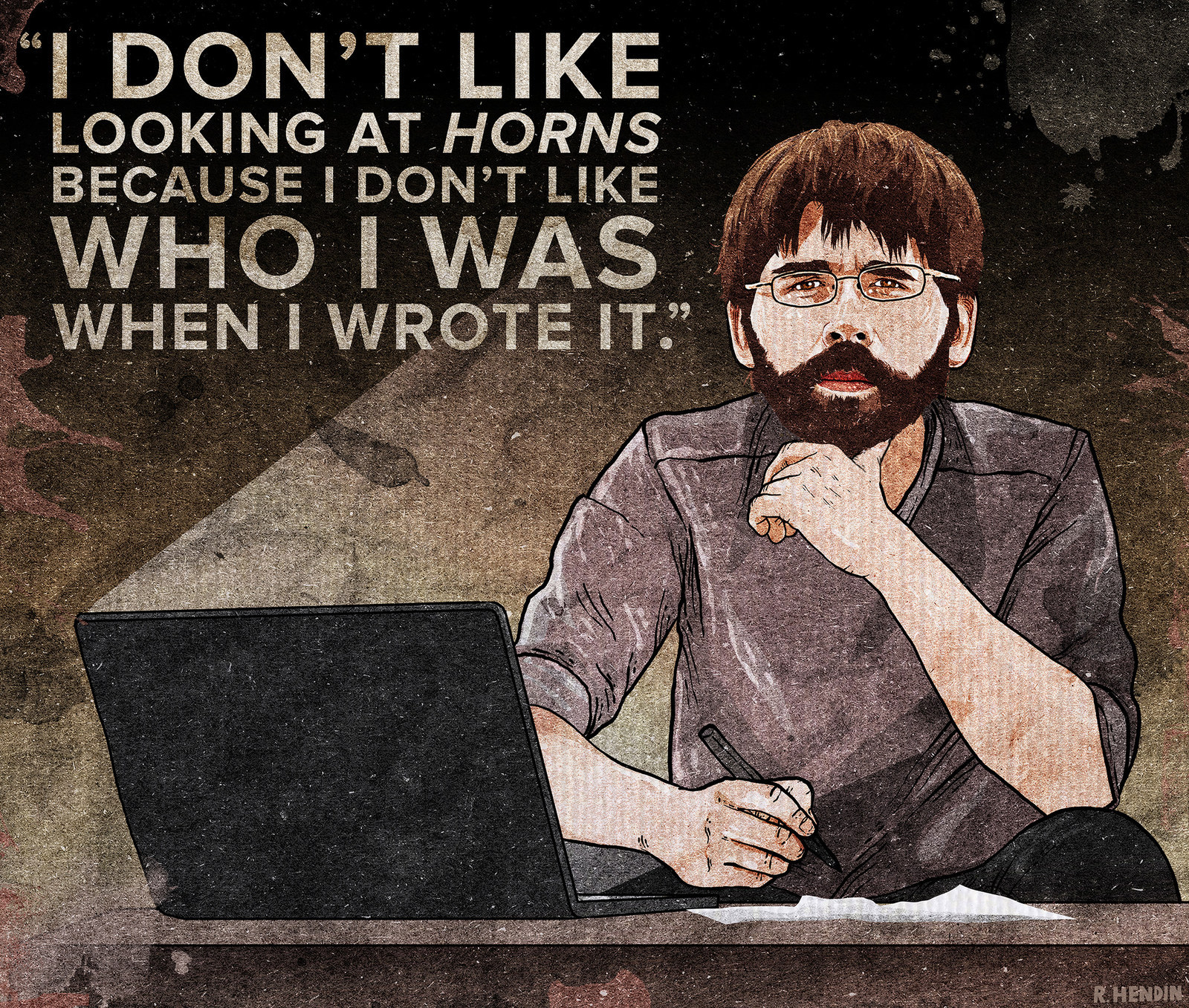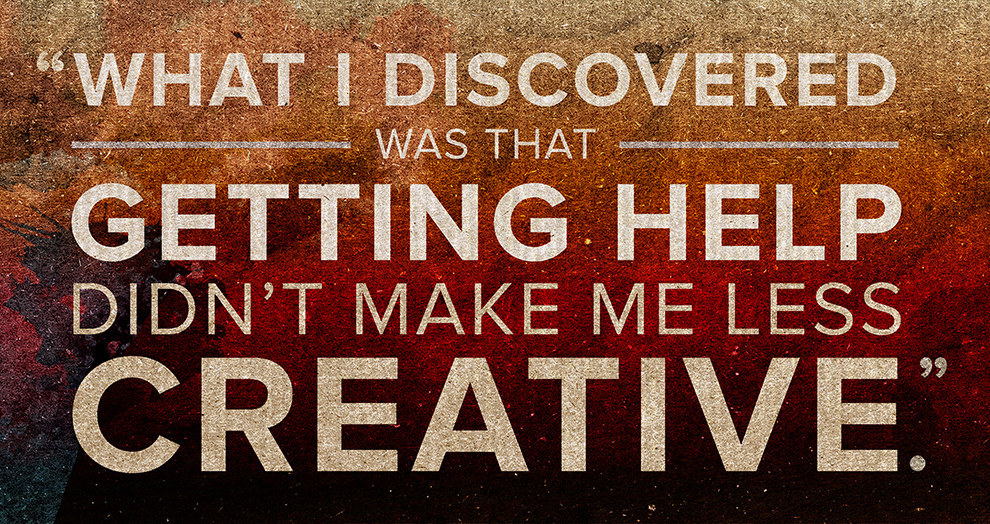When his second novel, Horns, was published in 2010, Joe Hill went on tour just like any successful author with a new novel would.
He did in-store readings wearing a pair of red plastic horns. His fans loved the goofiness of it, the uncool and relatable guy who just happened to write all those books they liked.
After the Horns events Hill would go back to his hotel room and tear the place apart looking for fibre optic cameras because he was convinced he was being spied on.
He did it in every room he stayed in.
In 2006, Hill was just some guy at the Nottingham FantasyCon, one of many young writers hanging around in the hotel bar.
He had one short story collection – 20th Century Ghosts, out for a year at that point – which people said was good. Really good. He won an award for it that weekend.
As he made his way back to his seat at the ceremony with his gargoyle trophy in his hand, I remember saying out loud, “It's weird how much Joe looks like Stephen King.”
“There’s a reason for that,” said the person next to me, who already knew the secret because he was Neil Gaiman. Five months later, Variety blew Hill's cover.
“It’s obviously part of the story,” he tells me. “My dad is Stephen King, and I’ve told this before, but it still sort of defines my mindset: I decided when I was 18 that I wasn’t going to write as Joseph King. I thought if I wrote as Joseph King, I might get published just because I had a famous dad. I didn’t want to succeed in that way, because I didn’t believe it would be real success.”
The idea that people might buy a less-than-excellent book that got published without him having earned it on his own merit filled Joe with an almost physical sickness. So he made it harder for himself: He cut his surname and halved his middle name (Hillstrom).
Everyone knows this story now, it’s no secret – father and son have publicly collaborated on short stories, and one was published in Esquire magazine. But what’s in a pen name? Did it get him anything but a stack of rejection slips? Most importantly, did it make him the better writer he wanted to be?
“I wrote several novels that I couldn’t sell to save my life. I spent three years on a novel called The Fear Tree, which became a huge international bestseller in my imagination but was, in real life, turned down by every publisher in New York, England, and Canada. I wrote short stories that sucked.”
The pen name made him work for it. In his twenties he deliberately wrote stories about things he knew nothing about – divorce, working in bleak office cubicles, having kids and living in the suburbs – the kind of short stories you’d get in the New Yorker, the kind of stories Stephen King wouldn’t write. According to now 43-year-old Hill, and according to commissioning editors, they sucked.
But then the pen name freed him: He realised Joseph King couldn’t write horror stories, because everyone would just compare them to his father’s horror stories. But Joe Hill? Joe Hill was just some guy. He could write whatever he liked. His work got better when he started writing the things he wanted to write: horror.
Joe Hill is a guy who grew up reading Fangoria magazine.
He wanted to make monsters.

While his parents completely supported the pen name, his dad, who loved The Fear Tree, faltered a bit when it kept getting turned down.
“There was one phone call where he sounded very hesitant," Hill says, "and he said something along the lines of, ‘Maybe if you brought it out under your own name, I really think it might get a good reaction,’ and I said, ‘Dad, I know where you’re coming from, I just don’t want to do that.’ When things started to sell, when I won a prize, when things started to snowball a little, no one enjoyed it more than my dad.”
And things have snowballed. I wanted to know how his life had changed – had success, the stack of novels, the Hollywood adaptation, the comic book series, and the thousands of fans changed the guy I met in Nottingham a bunch of years ago?
Basically: Yeah, but not in the way I'd expected. He’s still the kind of guy who will beat both his publicist and the journalist to the hotel lobby and sit there quietly reading, politely waiting, for god knows how long. He will still spend 20 minutes talking about a transcendent pastry he just ate and how his life will now be bisected by a cronut: BC, before cronut; AC, after cronut.
But he did, in his words, lose his mind.
“I hate all those clichés about success. I hate all those clichés about the person who has the hit and then instantly has the divorce and the nervous breakdown. But things become a cliché because they’re true. My follow-up to Heart-Shaped Box [his first novel, published in 2007] was the divorce and the nervous breakdown.”
When he tells me about it in his hotel restaurant it sounds like it’s the cliché that annoys him more than what actually happened. No one wants to be that guy, is what his face says. “I turned into a terrible crazy person, shouting at myself in cars.”
Between Heart-Shaped Box and Horns he wrote three different books he couldn’t finish. He completely forgot anything he ever knew about writing a good story. It took two years to claw it back.
What he did was this: He rented a house away from his family home, and rode to it every morning on his motorcycle. The only things in the house were a desk, a chair, his laptop, and a 1960s Elmore Leonard crime novel called The Big Bounce.
“I would start my day by copying out two pages of The Big Bounce. I’d copy sentence after sentence, trying to get the rhythms back. How does good writing sound? What does good dialogue sound like, how does a story move? I would do about two pages of it and the last couple of sentences would be my own. I was writing The Big Bounce but I was writing my version of The Big Bounce. Then I would change documents and start writing Horns.”
While Horns doesn’t sound or feel like an Elmore Leonard novel, this weird tactic allowed Hill to stretch out and find his own voice again. He never finished his version of The Big Bounce (provisionally titled The Bigger Bounce). He got 40 or 50 pages in before Horns was cooking. “I didn’t need it any more. I just stopped looking at The Big Bounce and let Horns flow.”
After he finished Horns, Hill never went back to the big empty house. He went on tour. Horns was adored, and many think it’s his best work. It became a Daniel Radcliffe movie that did OK at the box office. But he doesn’t like looking at the book all that much.
“It’s another cliché. I hate when the artist – the really self-serious artist – is like, ‘I don’t know how anyone can dance to that song, I was so unhappy when I wrote it.' And I always think, ‘Don’t be a pretentious twat – get over yourself.’ But I sort of feel that way about Horns. I’m so glad it’s a fun read. I’m so glad people love it. But I don’t like looking at it, because I don’t like who I was when I wrote it.”
The guy who wrote Horns was the same guy who pulled his hotel rooms apart.

“I was just really paranoid and really depressed and really unhappy and full of really nutty ideas. I would call my dad with my latest crazy ideas and he would patiently listen. He was the only person who could listen to me. And he’d talk me through and explain why my latest idea about being pursued and prosecuted and persecuted was irrational.”
Hill wouldn’t go into what he calls his “terrible, lunatic notions”, because he doesn’t like revisiting them. But eventually his dad suggested that seeing someone professionally could help him out – an idea Hill had resisted because he was convinced the paranoia and “lunatic ideas” were connected to his creativity. “I thought if I got help, I wouldn’t be able to write any more.”
It all goes back to another cliché: the crazy artist. But as a crazy artist, he got no actual work done. The three novels he couldn’t finish are testament to that cliché being bullshit.
"I got into therapy and I got on a pill, and what I discovered was getting help didn’t make me less creative. What was making me less creative was being a depressed crazy person. Figuring out how to be happy and have fun with the kids again, how to have fun with my life and work, actually made me a better writer, not a worse writer.”

Hill points at his 2013 novel NOS4R2 and the second half of his comic book series Locke & Key – stories like "Sparrow" – all things that were written after he started taking the antidepressant Paxil. He argues that it’s better work than he was doing before he got help.
Other writers and a change in the way he actually wrote stuff helped. Neil Gaiman started writing novels longhand in the '90s, with Stardust. When Hill was having trouble getting words on the page, Gaiman told him to pick up a literal pen.
“Neil suggested I try writing first drafts longhand. Suddenly, writing was freeing. I love that part of the day where I’m away from the internet and the phone, and I put on my record – a real record, a vinyl record, not the iPod; lately it’s been the Decemberists – and I write longhand. I’ll write notes to myself in the margins and I’ll write one sentence and then I’ll rewrite the sentence above it. Trying out different sounds. It just feels so much more freeing than sitting there at the computer.”
It’s not just the distractions of Twitter and the internet that stemmed the workflow. The computer conspires to hide how much work you’ve done, Hill says; it deprives you of the tiny checkpoints where you get some sense of achievement.
“You’re always just looking at the same screen instead of looking at eight pages where you’re like, ‘I wrote this today.’ I think there’s a physical satisfaction in seeing the ink on the page.
“I also think – and I’ve seen some studies to suggest this is true – that the physical act of shaping letters with your hand is like an artistic act that shuts off the critical sensor in your brain. The part of you that’s a critic is focused on the words on the page, getting the letters right instead of saying, ‘Oh, that’s a stupid sentence.'”
Hill still has his paranoid ideas, but they’re more grounded now. They’re the ones we all have. Apart from the first one – the one where people say, "Boy, Joe Hill wrote two really good short stories in the early '00s, but ever since 'Pop Art', it’s been all downhill."
The rest are just about being a regular guy.
“We’re back into cliché land. You worry about something terrible happening to the kids. You worry about all the things you can’t protect them from. You don’t want them to be hurt. You don’t want them to be killed. You don’t want them to suffer. You can’t protect them from the world.
“Time and chance happen to us all. Sometimes the plane does catch fire, sometimes the boat does hit an iceberg. All three of my children have the bad luck to be humans on Planet Earth.”
Joe Hill's new novel, The Fireman, is out in May 2016. The Fear Tree remains unpublished.


